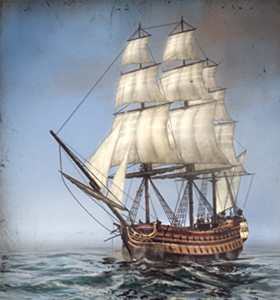Difference between revisions of "Indiaman (NTW Unit)"
m (moved Indiaman (NTW Unit) to Indianman (NTW Unit): Correcting spelling) |
Tango12345 (talk | contribs) m (Quick-adding category "NTW Ships" (using HotCat)) |
||
| (4 intermediate revisions by 4 users not shown) | |||
| Line 10: | Line 10: | ||
*[[France (NTW Faction)|France]] | *[[France (NTW Faction)|France]] | ||
*[[Great Britain (NTW Faction)|Great Britain]] | *[[Great Britain (NTW Faction)|Great Britain]] | ||
| + | *[[Russia (NTW Faction)|Russia]] | ||
| + | *[[Portugal (NTW Faction)|Portugal]] | ||
| + | *[[Bavaria (NTW Faction)|Bavaria]] | ||
| + | |||
| + | |||
| + | [[Category:NTW Units]] | ||
| + | [[Category:NTW Ships]] | ||
Latest revision as of 07:51, 30 May 2017
Overview
Unusually for a merchant ship, an Indiaman carries cargo, passengers, and a good number of guns. Intended to sail from Europe to the other side of the world and back carrying valuable, even priceless, cargoes, these ships have to be able to defend themselves. The Indiaman’s 9- and 18-pounders are sufficient to fight off smaller attackers, but it is vulnerable to boarding. Carrying a cargo does not help its speed either, and the added guns mean the upkeep has an impact on any profit made. However, a defendable trade ship is always more profitable than stolen goods or kidnapped passengers.
Historically, East Indiamen resembled ships of the line, both in their general configuration and paintwork. At the Battle of Pulo Aura (1804), the ambiguous appearance and aggressive handling of a squadron of British Indiamen completely humbugged the French admiral, Charles-Alexandre Linois. He withdrew in the face of “superior” forces. Commodore Nathaniel Dance, of the British Company fleet, received a knighthood and a handsome reward for his cunning.
